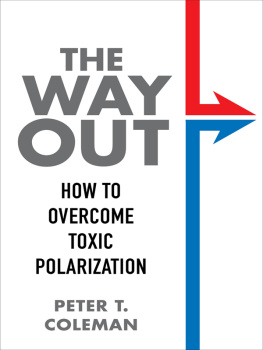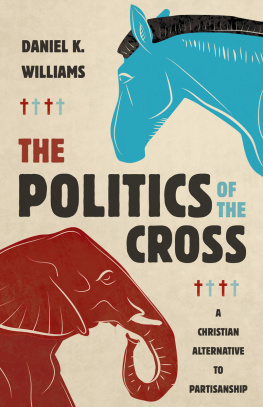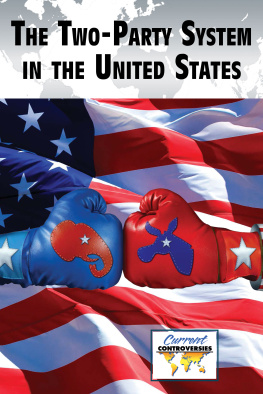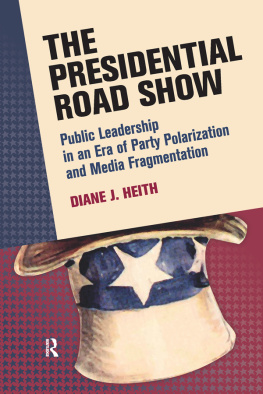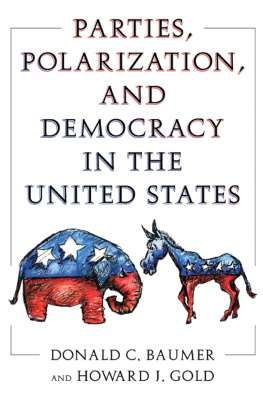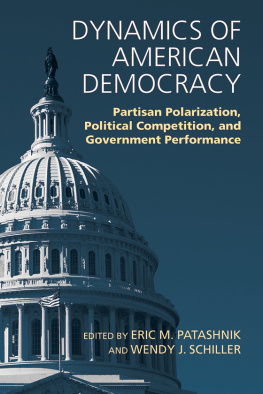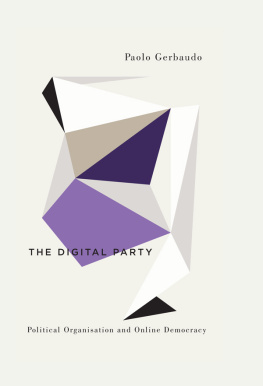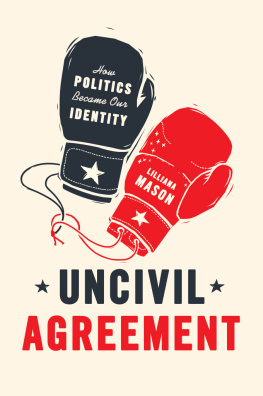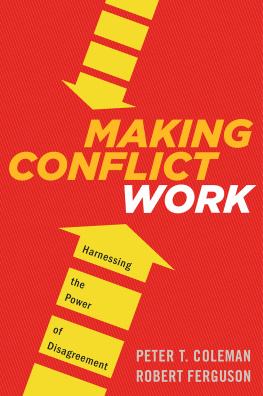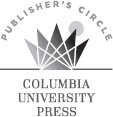Table of Contents
Praise for The Way Out
Peter T. Colemans latest is a tour de force: eminently readable, with compelling stories from the streets of Watertown, MA, and the negotiating tables of Northern Ireland yet replete with frameworks and insights that help Americans understandand chart a way out ofour polarized national condition. The Way Out is a road map to a more perfect union.
SHAMIL IDRISS, CEO OF SEARCH FOR COMMON GROUND
The Way Out offers the most comprehensive and succinct understanding of how polarization leads to harm and dysfunction in our current American landscape. With the clarity of empirical evidence and open imagination, these pages explore the opportunities available to engage and transform these dynamics toward far healthier and responsive interactions that reinvigorate our social contract and democracy. A treasure trove of insight and instruction, this is the best scientific and practical guide I have read about toxic polarization. Colemans gift of a book could not be better timed or more laser focused.
JOHN PAUL LEDERACH, AUTHOR OF THE MORAL IMAGINATION: THE ART AND SOUL OF BUILDING PEACE
In The Way Out, Coleman tackles a critically important issue, a topic on everyones mind: the emergence of a unique brand of polarization, centered less on policy disputes than on tribal instincts. Not only do we disagree with the other side, but we are convinced that their views are dangerous and that they are the true threat to the nation. Coleman lays out a new perspective regarding the roots of this hyperpolarization in a lively, accessible way and, most importantly, offers a detailed map out of the quagmire.
DANIEL M. SHEA, AUTHOR OF WHY VOTE? ESSENTIAL QUESTIONS ABOUT THE FUTURE OF ELECTIONS IN AMERICA
The great value of Colemans book consists in setting out positive approaches that can be pursued where disputes on political issues relate to peoples differing values and priorities and where our emotional impulses prevent effective engagement with other people: for this reason, the book should be widely read and used by conflict-resolution practitioners.
PROCESS NORTH
THE
WAY
OUT
Columbia University Press gratefully acknowledges the generous support for this book
provided by a Publishers Circle member.
Columbia University Press
Publishers Since 1893
New YorkChichester, West Sussex
cup.columbia.edu
Copyright 2021 Peter T. Coleman
All rights reserved
EISBN 978-0-231-55215-8
Library of Congress Cataloging-in-Publication Data
Names: Coleman, Peter T., 1959 author.
Title: The way out: how to overcome toxic polarization / Peter T. Coleman,
PhD, Columbia University.
Description: New York : Columbia University Press, [2021] | Includes index. |
Identifiers: LCCN 2020051516 (print) | LCCN 2020051517 (ebook) |
ISBN 9780231197403 (hardback) | ISBN 9780231552158 (ebook)
Subjects: LCSH: Conflict managementUnited States. | Polarization (Social sciences)
United States. | Political participationUnited States. | Interpersonal relations
United States.
Classification: LCC HM1126 .C573 2021 (print) | LCC HM1126 (ebook) |
DDC 303.6/9dc23
LC record available at https://lccn.loc.gov/2020051516
LC ebook record available at https://lccn.loc.gov/2020051517
A Columbia University Press E-book.
CUP would be pleased to hear about your reading experience with this e-book at .
Cover Design: Julia Kushnirsky
This book is dedicated to the 86 percent of Americans who are
currently exhausted, miserable, and desperately seeking a way out
of our culture of contempt.
CONTENTS
While Rome Burns
I t feels both urgent and frivolous to sit with my laptop and opine about the science on reducing toxic forms of polarization while my various devices send me constant updates on the reality of the increasingly tense, poisonous, fractured, state of our union. Initially, the context was birtherism, Benghazi, and Brexit, but then it jumped to Russian hacking of our elections, the Mueller inquiry, and Trumps impeachment. Then, amid this crisis of Western democracy, my family and I suffered the profound, unexpected loss of a dear, twenty-seven-year old friend, the only son of our closest friends. Immediately afterward came COVID-19 (which we contracted in February), a nearly complete worldwide social and economic shutdown, and unprecedented levels of civil unrest in our streets triggered by the perpetual stream of brutal killings of unarmed Black Americans at the hands of our own police.
I am deeply shaken. We are destabilized.
In the context of this maelstrom, I wrote this book. It will not rid us of predatory despots, racists, misogynists, anarchists, or other types of extremists and opportunists who take advantage of our divisive human tribal tendencies to gain power. These pathologies are afflicting societies around the world and are nearing epidemic levels in the United States. Many in politics and the media have learned to play these forces like maestros. It is clear to me that they must be actively challenged, fought, blocked, controlled, and legally constrained if our original vision of American democracyof optimism and egalitarianism and fairness and E pluribus unum (out of many, one)is ever to be realized. However, this book is not about how to win this fight.
It is about finding another way out of it.
I grew up in middle America in a lower working-class family who struggled to make ends meet. Born in Chicago, my mother, siblings, and I fled a dangerous situation there (my father drank, gambled, and owed money to violent men) and moved to Iowa when I was ten, where I was thereafter raised in a single-parent home. Although my mom worked to exhaustion, we found ourselves needing to go on welfare, so to help out I began working at the age of ten. Since then, I have held more than fifty different jobs, many of them menial labor, to make my way out of hard times. Despite being pigeonholed as an indigent Industrial Ed kid in high school, I attended college at a state school, moved to New York City, eventually got a PhD, and today live on the Upper West Side where I am proud to be a professor of peace and conflict studies at Columbia University.
All this to say that I feel a genuine connection with, and concern for, both Americas: rural and urban, poor and well-off, progressive and conservative. No, I am not a fan of Donald Trump, and I feel his mean-spirited divisiveness; trivialization of facts, truth, and science; and profound selfishness and recklessness are dangerous in a president. But I understand why some see him as a folk hero, so I am an advocate for many Trump voters as well as adamant anti-TrumpersI understand how they got there. Because I, too, am angry.
There is an old tale about a Cherokee elder who was teaching his grandchild about life and said, A fight is going on inside you. It is a terrible fight between two wolves. One wolf represents fear, anger, envy, greed, arrogance, and ego. The other stands for joy, peace, love, hope, kindness, generosity, and faith. The same fight going on inside you is inside every other person too. The child thought about it for a moment and then asked, Which wolf will win? The old man replied, The one you feed.

